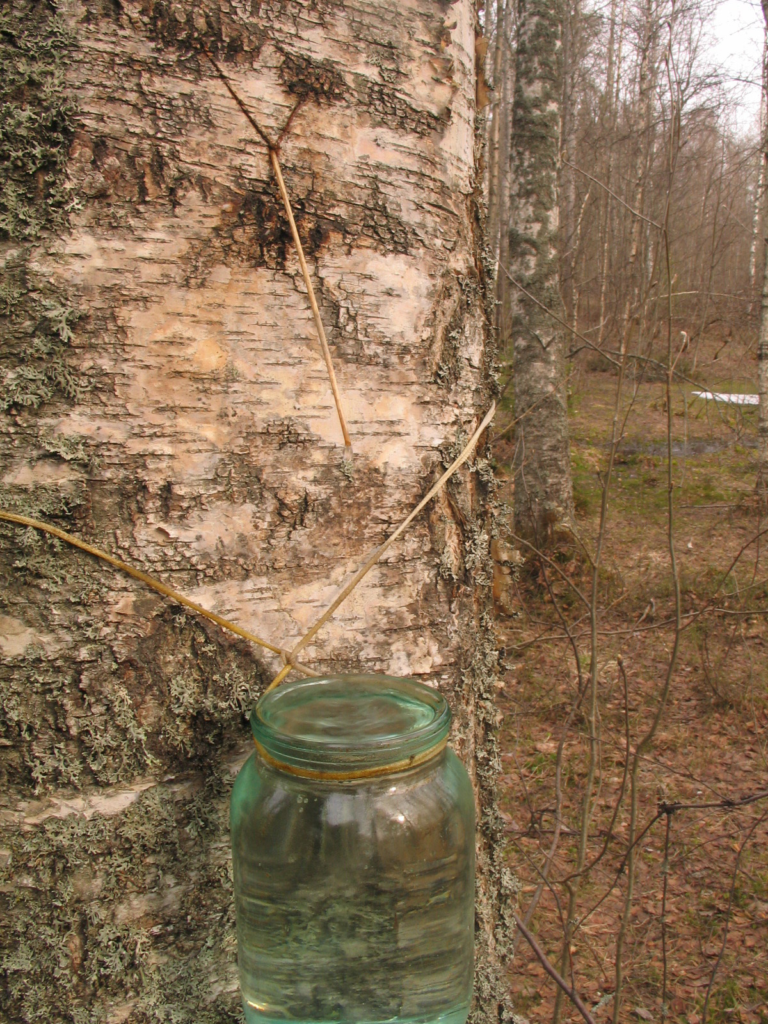As winter loosens its grip and spring awakens the natural world, a unique phenomenon occurs in birch trees. Their sap begins to flow, offering a refreshing and potentially health-boosting beverage traditionally known as birch sap, birch water, or birch juice. This blog delves into the world of birch SAP, exploring its history, nutritional profile, potential health benefits, harvesting methods, and how to incorporate it into your diet.

A Timeless Tradition: Birch Sap’s Historical Significance
It has been revered for centuries in various cultures across Northern Europe, parts of Asia, and even North America. Here’s a glimpse into its historical significance:
- Indigenous Uses: Indigenous communities in these regions have traditionally usedsap for its medicinal properties, consuming it fresh or fermenting it for a slightly alcoholic beverage.
- Spring Tonic: In many cultures, birch was viewed as a cleansing and revitalizing drink, consumed during the springtime to cleanse the body after a long winter.
- Symbolism & Folklore: Birch trees and their sap hold symbolic meaning in various cultures, often associated with renewal, purification, and good health.
Beyond Tradition: The Nutritional Profile of Birch Sap
It boasts a unique nutritional profile, making it an interesting addition to a healthy diet:
- Low in Calories and Sugar: It is naturally low in calories and sugar, making it a refreshing alternative to sugary drinks.
- Rich in Minerals: It contains essential minerals like potassium, calcium, magnesium, and manganese, which are crucial for various bodily functions.
- Source of Electrolytes: It provides electrolytes like sodium and potassium, which are important for maintaining hydration and proper muscle function.
- Natural Antioxidants: Some studies suggest birch sap may contain antioxidants that can help protect cells from damage.
The Science Behind the Benefits: Exploring Potential Health Advantages
While more research is needed to fully understand the health benefits of birch sap, some potential advantages are being explored:
- Detoxification & Diuretic Properties: Birch sap’s traditional use as a spring tonic might have some basis. Its mild diuretic properties may help flush toxins from the body.
- Improved Hydration: The combination of electrolytes and water content in sap can contribute to better hydration, especially during exercise or hot weather.
- Anti-Inflammatory Effects: Early research suggests sap may possess anti-inflammatory properties, potentially offering benefits for conditions like arthritis or inflammatory bowel disease.
- Skin Health: Birch sap’s purported anti-inflammatory properties and mineral content might contribute to skin health when consumed or used topically (limited research available).
Tapping into Tradition: Sustainable Harvesting Methods
Birch harvesting is a delicate process to ensure the tree’s health and sustainability:
- Timing is Key: Sap tapping typically occurs in early spring, just before the buds begin to open. This is when the sap flow is at its peak.
- Sustainable Techniques: Small holes are drilled into the trunk, and spiles are inserted to collect the sap without harming the tree. Responsible harvesting practices ensure long-term sustainability.
- Respecting the Tree: Experienced harvesters tap only mature trees and limit the amount of sap collected to avoid stressing the tree.
From Forest to Fridge: Enjoying Birch Sap in Your Diet
It is a versatile ingredient that can be enjoyed in several ways:
- Fresh & Pure: The most common way to consume birch sap is fresh, offering a slightly sweet and refreshing taste. Enjoy it chilled for a truly invigorating experience.
- Cocktails & Mocktails: Birch sap’s unique flavor profile can add a subtle sweetness and depth to cocktails or mocktails. Experiment with various recipes to discover your perfect blend.
- Culinary Creations: It can be used in various culinary applications, such as making syrups, glazes, or even adding a unique twist to pancakes or smoothies.
A Word of Caution: Responsible Consumption & Potential Risks
While generally safe for consumption, here are some things to keep in mind:
- Source & Quality: Ensure you obtain birch sap from a reputable source that uses sustainable harvesting practices.
- Short Shelf Life: Fresh birch sap has a limited shelf life. Consume it within a few days of harvesting or purchase refrigerated options.
- Potential Interactions: If you have any pre-existing medical conditions or are taking medications, consult your healthcare provider before consuming birch sap.
Conclusion
It offers a unique combination of tradition, potential health benefits, and a refreshing taste. By understanding its historical significance, nutritional profile, and responsible harvesting practices, you can incorporate this natural beverage into your diet and experience a taste of spring’s bounty.
Ready to explore the world of birch sap? Here are some additional tips:
- Explore Local Options: If you live in an area with birch trees, consider researching local farms or producers who harvest birch sap sustainably.
- Embrace experimentation: Get creative with it in your kitchen! Use online resources and recipe blogs to discover unique ways to incorporate it into your meals and beverages.
- Sustainable Practices: When purchasing birch sap, opt for brands that prioritize sustainable harvesting methods to ensure the continued health of birch forests.
Beyond the Beverage: Exploring Birch Sap’s Other Uses
While birch sap is primarily known as a drink, its potential benefits extend beyond hydration:
- Skincare Applications: It extract is gaining popularity in the cosmetics industry due to its purported anti-inflammatory and hydrating properties. Look for skincare products containing birch sap extract for a potential boost to your skincare routine.
- Hair Care: It might offer benefits for hair health as well. Some hair care products utilize birch sap extract to promote a healthy scalp and shiny hair. However, more research is needed in this area.
A Final Note: Moderation is Key
While birch sap offers potential health benefits, it’s important to remember moderation is key when incorporating it into your diet. Treat it as a refreshing occasional beverage or a unique culinary ingredient, not a replacement for water or a primary source of nutrients.
Birch sap: A Gift from Nature
It presents a fascinating connection between tradition, potential health benefits, and the natural world. As research continues to explore its properties,it may well emerge as a valuable addition to a healthy and sustainable lifestyle. So, the next time spring whispers its arrival, consider seeking out birch sap and experiencing a taste of this unique seasonal offering.
YOU MAY BE INTERESTED IN:
The Mental Health Crisis: Navigating a Growing Problem




